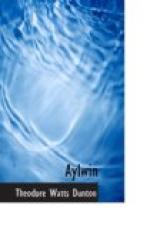Rossetti used to say that since Blake there has been no more visionary painter in the art world than Smetham. Rossetti had a quite affectionate feeling towards Smetham, and several of his pictures (small ones) were on Rossetti’s studio walls. I remember one or two extraordinary pictures of his—especially one depicting a dragon in a fen, of which Rossetti had a great opinion; and I believe this, with other pictures of Smetham’s, is in the hands of Mr. Watts-Dunton. The author of Aylwin would have been much amused had he seen, as I did, in an American magazine the statement that ‘Wilderspin’ was identified with William Morris—a man who was as much the opposite of the visionary painter as a man can be. Morris, whom I had the privilege of knowing very well, and with whom I have stayed at Kelmscott during the Rossetti period, is alluded to in Aylwin (chap. ix. book xv.) as the ‘enthusiastic angler’ who used to go down to ‘Hurstcote’ to fish. At that time this fine old seventeenth-century manor house was in the joint occupancy of Rossetti and Morris. ‘Wilderspin’ was Smetham with a variation: certain characteristics of another painter of genius were introduced, I believe, into the portrait of him in Aylwin; and the story of ‘Wilderspin’s’ early life was not that of Smetham. The series of ‘large attics in which was a number of enormous oak beams’ supporting the antique roof was a favourite resort of my own; but all the ghostly noise that I there heard was the snoring of young owls—a peculiar sound that had a special fascination for Rossetti; and after dinner Rossetti, my brother, and I would go to the attics to listen to them.
But a more singular mistake with regard to the Aylwin characters than that of Morris being confounded with ‘Wilderspin’ was that of confounding, as certain newspaper paragraphs at the time did, ’Cyril Aylwin’ with Mr. Whistler. I am especially able to speak of this character, who has been inquired about more than any other in the book. I knew him, I think, even before I knew Rossetti and Morris, or any of that group. He was a brother of Mr. Watts-Dunton’s—Mr. Alfred Eugene Watts. He lived at Park House, Sydenham, and died suddenly either in 1870 or 1871, very shortly after I had met him at a wedding party. Among the set in which I moved at that time he had a great reputation as a wit and humorist. His style of humour always struck me as being more American than English. While bringing out humorous things that would set a dinner-table in a roar, he would himself maintain a perfectly unmoved countenance. And it was said of him, as ‘Wilderspin’ says of ‘Cyril Aylwin,’ that he was never known to laugh. The pen-picture of him in Aylwin is one of the most vivid things in the book.




